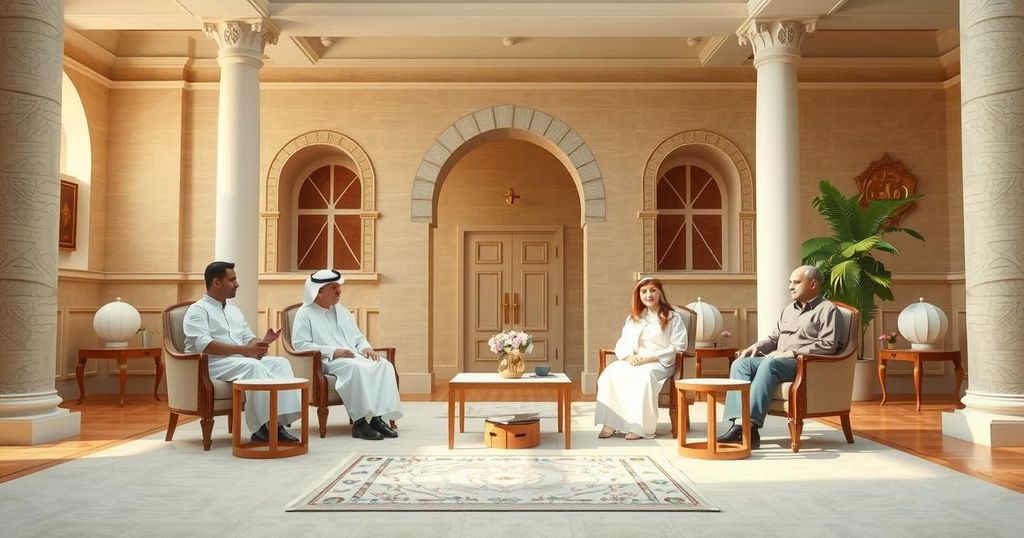Russia’s Diplomatic Perspectives on the Ukraine Conflict and Beyond
In an interview, Dmitry Polyanskiy, Russia’s deputy UN representative, accused the Biden administration of exacerbating the Ukraine war and praised Saudi Arabia’s diplomatic role. He contrasted previous U.S. administrations, highlighting the importance of Arab countries in mediating issues in Gaza and beyond. Additionally, he addressed Russia’s support for Sudan and its historical relationship with Syria, advocating for peace and collaboration in resolving conflicts.
The first deputy permanent representative of Russia to the UN, Dmitry Polyanskiy, has expressed that the Biden administration has been part of the problem concerning the Ukraine war rather than a solution. In an interview with Arab News, he discussed the complexities surrounding the conflict and commended Saudi Arabia’s emerging role in international diplomacy following recent talks. Polyanskiy noted that the Biden administration is perceived to have aggravated the situation, claiming that the prior American administration also contributed negatively to the crisis.
Polyanskiy criticized Washington’s approach as one that has fueled conflicts, noting, “The Biden administration was one of those who was fueling the war, who was trying to do everything to inflict a strategic defeat on Russia.” He contrasted this with the Trump administration, which he characterized as having a more realistic view of the situation on the battlefield, enabling proposals aimed at de-escalation. He remarked, “President Trump has just changed the optics.”
The recent talks in Riyadh involved discussions of a possible ceasefire conditionally linked to easing sanctions on Russia, marking Saudi Arabia’s ascent as a diplomatic center. Polyanskiy welcomed this development, stating, “The world is changing and new centers of diplomatic activity are emerging.” He acknowledged Saudi Arabia’s active role in facilitating dialogue among the conflicting parties and expressed gratitude for their hospitality in hosting the discussions.
Moreover, Polyanskiy addressed broader issues, including the Palestinian crisis, emphasizing Russia’s consistent support for a two-state solution. He indicated that Russia’s influence in pressing Israel was limited compared to the US but underscored the importance of Arab nations mobilizing for peace. He stated, “I think that very much will depend on the mobilization of Arab countries themselves.”
In discussing the situation in Sudan, Polyanskiy praised the Sudanese government for its military efforts against the Rapid Support Forces (RSF) while defending Russia’s veto of a UN resolution for a ceasefire. He highlighted the necessity of balancing the narrative surrounding the humanitarian crisis without diminishing the authority of the Sudanese government.
Additionally, Polyanskiy reflected on Russia’s longstanding support for Syria amidst ongoing challenges. He expressed a desire for a peaceful transition period, emphasizing the importance of inclusive governance and combating terrorism. He highlighted the enduring ties between Russia and Syria, indicating a mutual respect and potential for cooperation despite challenges faced by the Assad regime.
In conclusion, Polyanskiy’s remarks convey a multifaceted perspective on contemporary geopolitical challenges, underscoring Russia’s criticism of the US approach to various conflicts. As Russia engages constructively with countries like Saudi Arabia, it underscores the need for realistic diplomatic efforts aimed at resolving ongoing conflicts in Ukraine, Gaza, Sudan, and Syria.
Dmitry Polyanskiy elucidates Russia’s critical stance on U.S. foreign policy, particularly under the Biden administration, regarding the Ukraine conflict. He underscores the significant role Saudi Arabia is playing in international diplomacy while advocating for a two-state solution in the Palestinian crisis. Furthermore, Polyanskiy expresses unwavering support for the Sudanese government and emphasizes the importance of a collaborative approach in Syria. This collective narrative highlights the dynamic changes in global diplomacy and the necessity for collaborative solutions to complex conflicts.
Original Source: www.arabnews.jp




Post Comment